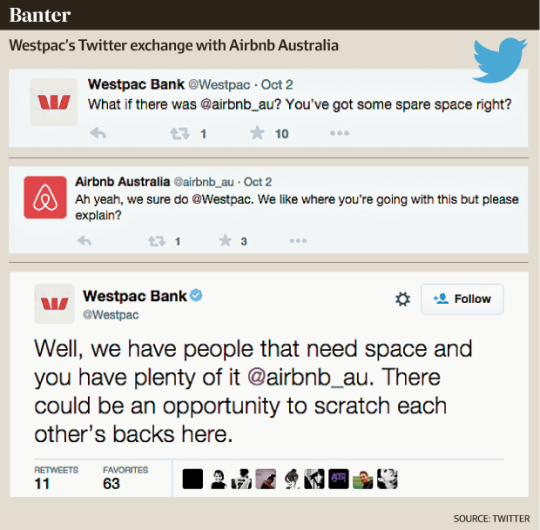Westpac and Airbnb launched a new collaborative marketing campaign last night, ‘your spare, spare room’. The campaign is simple: enter to win one of 50 $250 vouchers for Airbnb. The questionable rationale for Westpac and Airbnb’s association it to facilitate the homeownership process. Specifically, the promotional video shows a young homeowner feeling limited by her parents’ overwhelming presence during the move. She needs space! And so, she rents them a spare Airbnb room.
The campaign does not explicitly advertises a Westpac product, except for a link to ‘Find out more’ about how to get a home loan. Rather, it has been construed by commentators as a mechanism to attract a younger customer base. Whether the campaign responds to a relatable consumer need, as presented in the fictitious scenario, is questionable especially given its target audience. How many homeowners, at least in Sydney, are young enough that their parents would be so closely invested in the process, let alone mobile enough to want to be present throughout the move.
It seems that, if the marketing campaign is not explicitly advertising a service, its main objective may be brand association: Westpac is associated with a young hip brand and Airbnb is associated with an experienced and legitimate brand.
A playful exchange
Leading up to last night’s launch, ‘your spare, spare room’ was the talk of the town, not unlike the high school’s latest mismatched couple. Westpac and Airbnb’s public flirt sure had the allure of a Facebook wall comment stream between two anxious teens. In fact, given the calculated nature of the messages, you could even liken the Westpac and Airbnb marketing teams to the friend squad advising the youthful lovers on the best emoji to use.

The Westpac and Airbnb’s twitter exchange was generally not so well received. Most responses either humorously or not so humorously, accused the stream of being corny and calculated: ‘Would you two please just go and get a room together (:’ and ‘This whole conversation is like a terrible AM radio commercial.’ Tony Lee, digital strategist pointed out the risk of people thinking the campaign ‘might not be an authentic piece of information’. His opinion is that people are very cynical of promotional [strategies] when it’s not done in a traditional way – sponsored tweets for example’.
However, it is a well known saying that all publicity is good publicity: people are talking and writing about it (guilty). Some users actually commended the innovativity of the exchange: ‘Unique, perhaps entertaining’. This aligns with the campaigns’ whole strategy: to appeal to a younger and digital market.
Westpac’s real intentions
Westpac’s general manager, Melanie Evans, says that ‘speaking to australia in a digital environment during the peak home buying season is key to Westpac’s marketing strategy and working with an innovative digital brand like Airbnb will allow us to reach [a] new audience.’ This is the ultimate game plan. It is less about promoting Westpac’s home loans with low interest and favourable terms but rather about tapping into a younger market or simply an innovation-oriented crowd. The thought process would be something along the lines of: ‘Airbnb is an business model I support: it’s innovative and a product of the shared economy. Westpac supports it – I’ll bank with Westpac.’
Westpac is not the only large, perceived rigid company that has sought to be associated with an upcoming digital company, although other partnerships also incorporate a practical element. For example, Qantas has a partnership with goCatch, the taxi booking app. Travellers who use goCatch earn Qantas points when they use the app. Toyota has also recently associated itself with BigCommerce, the e-commerce software developer.
Will it last?
Whether such associations are effective is unclear. Creative director for OgilvyOrg, Rob Morrison says it may not be so profitable to jump onto these new digital businesses’ success train. He argues they are liked ‘precisely because they are new’; therefore, it may be pointless for Westpac, a well established company to attempt to associate with Airbnb.
Associating with younger brands may be profitable in the short run by slightly shifting customers’ perceptions. A more long lasting effect may be achieved in the case of more fundamental incorporations of the digital service, like Toyota and Qantas. However, in the present case, it is unlikely a month long giveaway will shift Westpac’s customer base or reputation into the future.
Let us know your thoughts on this campaign by tagging us #lawpath or @lawpath.







